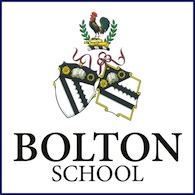This September 200 junior school boys at Bolton School and all the teachers throughout junior and senior boys and girls have been issued with iPads. Senior school pupils will start in a phased way from January. As a school we have decided, unequivocally, that computer tablet technology will have an important place in the educational landscape of the future. But just what is that place?
It is important to note that our decision is about computer tablets in general, not iPads in particular,á being a key technology. It is quite obvious why. For years keen teachers have tried to move forward with laptops, only to be thwarted by log in issues, battery life and, very practically, pupils hiding behind the laptop screen. Tablets do not have these issues and flat on the desk, at roughly the size of an exercise book, can take their proper place in the lesson.á At present the best tablets for education areá iPads. We have chosen them for that reason, not because iPads are trendy. We are retaining a hardwired PC based network and deliberately choosing as many platform non specific options as possible so that is the educational merit that drives development, not the technology.
There are very many powerful reasons to think e-learning is a must for schools. Higher education isá shifting much more rapidly in that direction than schools and most parents workplaces are technologically driven. It is simply obvious that we should use in schools the tools used in the wider world. But we are equally clear that e-learning is part of the variety of tools a great teacher has in their tool kit. It will take its place alongside books, a well delivered talk, classroom discussion and practical work. And school life cannot be one long game of googling. The teaching and learning experience is about human interaction and interpretation and development, assisted by a range of tools and never replaced by them.
It is because they are a tool and not a fashion accessory that we have decided to issue them to all pupils, just as we will issue exercise books. A ‘bring your own device’ policy seems just as temporary as a ‘bring your own text book’ policy. There are other important principles in this decision. iPads are individual devices – using them as ‘class sets’ is to shackle so many of their potential benefits as to make the investment almost futile. Also, if we issue them, we can control them, parents if they wish can define them as school property and control use at home in a quite different manner.With mobile device management school can ensure patterns of use inside and outside school we are comfortable with.
As the iPads take their place in school alongside other teaching and learning techniques we see three very clear phases of development, not necessarily sequential but definitely distinct. First, teachers will use them as easy access to their resources for projection in class, for administration and for communication.
Then we see many evolutionary aspects for the technology. Sharing resources with classes electronically will replace the photocopier, which in turn replaced the technologies that went before it. DVD replaced video and in turn it will be displaced by film libraries online. The trip to the computer room for a research exercise will become a quirky historical memory shared by a generation of school children. School notes used to be written in an exercise book and can now be written on the iPad.á Some well used computer simulations and pieces of software will be replaced by Apps.
Finally there will revolutionary aspects toá teaching and learning arising from the technology. The potential to annotate with audio recordings must be significant as is the easy use of colour, photographs and video. Bespoke apps will be written and no doubt in time classroom routines will alter.
We start on a long journey, one that is necessary if schools are genuinely to prepare young people for life. We do so by no means feeling modish or futuristic but simply adopting yet another tool for use in the classroom as teachers have done so very often over the years.

Leave a Reply